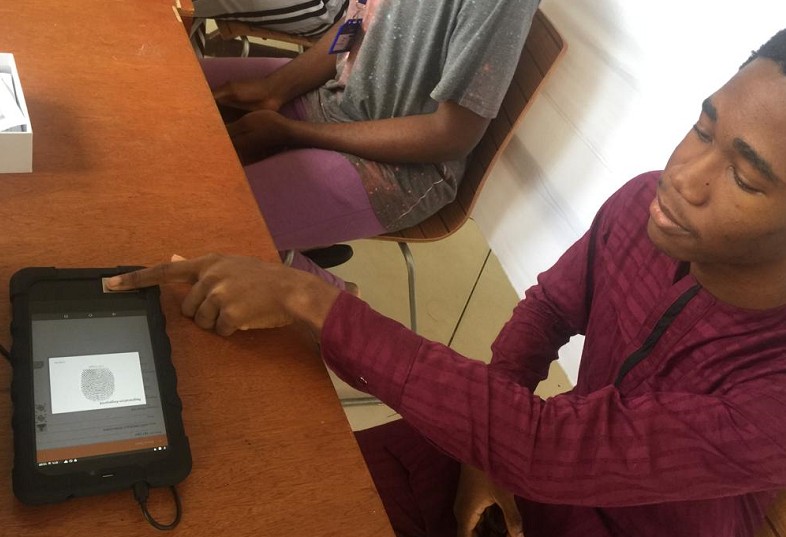Introduction
In the ever-evolving landscape of technology, innovation continues to shape the way we interact with devices. One such groundbreaking advancement is the emergence of biometric tablets, devices that integrate biometric authentication features into the familiar tablet form factor. These devices leverage the unique biological characteristics of individuals to provide secure and seamless interactions, promising a new era of convenience and privacy. This essay explores the concept of biometric tablets, delving into their definition, advantages, and diverse application scenarios.

Android Biometric Tablet with Fingerprint Scanner
What is a Biometric Tablet?
A biometric tablet is a portable computing device that incorporates biometric authentication technology, allowing users to access and interact with the device using their unique physiological or behavioral characteristics. Unlike traditional tablets that rely solely on passwords or PINs for user verification, biometric tablets offer a more secure and user-friendly alternative. Biometric authentication methods include fingerprint recognition, facial recognition, iris scanning, voice recognition, and even behavioral biometrics such as signature dynamics and keystroke patterns.
Advantages of Biometric Tablets
1. Enhanced Security:
One of the primary advantages of biometric tablets is the heightened security they offer. Biometric authentication relies on individual biological traits, making it significantly more difficult for unauthorized users to gain access. Passwords and PINs can be forgotten, stolen, or easily cracked, but replicating someone’s fingerprint or facial features is a much more complex task.
2. Convenience and User-Friendly Experience:
Biometric authentication simplifies the user experience by eliminating the need to remember complex passwords or carry around authentication tokens. With a simple touch of a finger or a glance at the camera, users can quickly and effortlessly unlock their tablets. This convenience not only saves time but also encourages broader adoption of security measures among users.
3. Personalization and Customization:
Biometric tablets can be programmed to recognize multiple users, allowing for personalized experiences. Each user’s preferences, settings, and applications can be tailored to their unique profile, enhancing the overall user experience. This personalization feature is particularly beneficial in shared environments, such as family tablets or corporate settings.
4. Reduced Risk of Identity Theft:
Biometric authentication adds an extra layer of protection against identity theft. Since biometric traits are unique to individuals and difficult to replicate, the risk of someone impersonating another person is significantly reduced. This is especially crucial in today’s digital age where identity theft is a growing concern.
5. Increased Efficiency and Productivity:
The speed and accuracy of biometric authentication contribute to increased efficiency and productivity. Users can quickly and securely access their tablets without the hassle of typing in passwords, making it ideal for situations where rapid access is essential, such as in business meetings or emergencies.
Application Scenarios of Biometric Tablets
1. Mobile Device Security:
Biometric tablets find extensive applications in securing mobile devices. As smartphones and tablets become integral parts of our daily lives, ensuring the security of these devices is paramount. Fingerprint and facial recognition technologies, in particular, have gained popularity in unlocking and securing mobile devices, offering a seamless and secure user experience.
2. Financial Transactions:
Biometric tablets play a crucial role in enhancing the security of financial transactions. Whether it’s accessing mobile banking apps, making digital payments, or authorizing financial transfers, biometric authentication provides a robust layer of protection against unauthorized access and fraudulent activities.

HFSecurity FP08 Biometric Tablet for Bank
3. Healthcare:
In the healthcare sector, biometric tablets contribute to the secure access of patient records and sensitive medical information. Healthcare professionals can use biometric authentication to ensure that only authorized personnel have access to patient data, maintaining patient confidentiality and compliance with privacy regulations.

Biometric Tablet with Face Recognition For Healthcare
4. Corporate Environments:
Within corporate environments, biometric tablets offer a secure and efficient means of access control. Employees can use their unique biometric traits to unlock devices, access sensitive company data, and even log into secure networks. This not only enhances security but also streamlines the login process for employees.

Biometric Fingerprint Tablet for Farm Attendance
5. Education:
Biometric tablets have the potential to transform the education sector by ensuring secure access to educational resources and personalizing the learning experience. Students and teachers can benefit from the convenience of biometric authentication in accessing educational apps, grading systems, and other digital learning platforms.
6. Government and Law Enforcement:
Government agencies and law enforcement entities leverage biometric tablets for identity verification and criminal investigations. Fingerprint and facial recognition technologies assist in identifying individuals, aiding in the apprehension of criminals, and ensuring the integrity of governmental systems.
7. Border Control and Travel:
Biometric tablets play a crucial role in border control and international travel. Airports and immigration authorities use biometric authentication to verify the identity of travelers, enhancing security and expediting the immigration process. This reduces the likelihood of identity fraud and improves overall border control efficiency.
Conclusion
Biometric tablets represent a significant leap forward in the realms of security, convenience, and personalization. The integration of biometric authentication into portable devices opens up a plethora of possibilities across various industries and use cases. The advantages of enhanced security, user-friendly experiences, and personalized interactions position biometric tablets as key players in the future of digital interaction.
In conclusion, the era of biometric tablets heralds a future where secure and seamless interactions are not only achievable but also integral to our daily lives. As technology continues to advance, biometric tablets will undoubtedly play a pivotal role in shaping the way we access information, conduct transactions, and interact with the digital world. The journey toward a more secure and user-friendly future has just begun, with biometric tablets leading the way.



